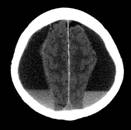HEAD INJURY

One of the conditions that may require urgent neurosurgical intervention is head injury. The brain and skull can be injured in various ways, such as vehicular accidents, fall from a height, gunshot wounds, and other mechanisms.
Clinically, brain injury is classified into mild, moderate, and severe, with the mild forms having the best chances of complete recovery. Patients who are awake with few or no neurological abnormalities are usually described to have mild head injury, while those who are comatose have severe brain injury.
Patients with head injury may have injuries in other parts of the body as well, so it is important to check everything thoroughly in the emergency room. Patients with suspected head injury undergo a CT scan in order to visualize the brain. Depending on the patient's clinical condition and the scan findings, surgery may be needed. Patients who are awake with minimal CT scan findings are usually observed and given medical treatment.
Below are some of the findings in head injury wherein surgery may be needed. In general, if these are small then patients can be observed, but if they are large and cause brain compression, then they need to be taken out.
Epidural hematoma (EDH) – blood clot between the bone and the dura (outer covering of the brain)
Acute subdural hematoma (ASDH) – fresh blood clot between the dura and the brain
Chronic subdural hematoma (CSDH) – old blood clot between the dura and the brain, usually seen in elderly people
Brain contusion - “bruising” of the brain
As for bony injuries of the skull, open fractures (break in skin + skull fracture) may require surgery to clean out the dirty bone and prevent infections. On the other hand, closed skull fractures (skin not broken) are generally left alone to heal by themselves unless they are causing brain compression or cosmetic deformity. |